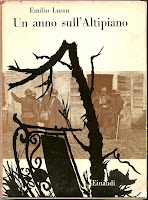
What Emilio Lussu (1890-1975) may teach us
Emilio Lussu was born in Armungia near Cagliari (Sardinia) in 1890. After having finished his law studies, he fought as infantry officer in the Sassari Brigade during World War I, distinguishing himself both for his bravery and his humane leadership qualities.
After the war, together with comrades from his Army Brigade, he founded the federalist and autonomist party "Partito Sardo di Azione". Elected to the Italian Parliament in 1921, he was a keen observer and a fierce opponent of the rising fascist movement led by Benito Mussolini. He became famous for his account of the political developments in Italy from 1921 to 1929: "Marcia su Roma e Dintorni" (March to Rome and surroundings) first published in Paris in 1933 (reprints by Einaudi in 1945 and 2003).A German edition is also available: Marsch auf Rom und Umgebung, Verlag Folio, Bozen 2007..


After repeated attempts to his life by fascist groups, he had eventually been attacked in his Cagliari appartment and during this episode had shot one of the aggressors. After an imprisonment of a year and a process that ended in his acquitment for self-defense, he had been deported to the Aeolian Island of Lipari, from where he was able to flee to France. In 1936, while being treated for tuberculosis at the Sanatorium of Clavadel near Davos (Switzerland), he wrote a vivid account of his experiences during the war in the trenches of Northern Italy: "Un Anno sul Altipiano" (A Year on the High Plateau). In his forword, he wonders why nobody seems to be ready to remember what happened between 1914 and 1918.
After 1933, he lived in Paris with his wife, Joyce, where he became one of the antifascist movementGiustizia e Libertà.
In 1940, after the defeat of the French army by Nazi Germany, the couple fled to Toulouse, then to Marseille and eventually to Lisbon. From 1940 to July 1943 he developped important underground diplomatic activities, trying to coordinate the activities of the Italian emigration with the geopolitical and strategical interests of Britain and the U.S.A., from Lisbon, Malta, London and New York. We owe him an account of these adventurous years in "Diplomazia clandestina" (Quaderni Del Ponte, La Nuova Italia Editrice, Firenze 1956)

In postwar Italy, Emilio Lussu served as a minister in the first cabinet of De
Gasperi and was elected to the Senate during several legislation periods. He died in 1975.
Why should one read Emilio Lussu's account of the rise of fascism in Italy of 1933(Marcia su Roma e Dintorni)today?
His account on the political events in Italy is written in a straightforward but elegant prose, with a sarcastic, sometimes fatalistic tone.
It is full of vivid observations of the weakness of his contemporaries and their excuses for giving up their political principles and entering the fascist party for fear of messing their professional carreers and their social life.
The reader of Lussu's account will know that there are important differences between Hitler's Third Reich and Italy under Mussolini: while Germany's working classes in their majority where favorable to the regime as a result of generous salarial and rent policy and while the German opposition was systematically neutralized and physically liquidated by the regime,a fragile balance between the formally intact constitutional monarchy and the Duce developped in Italy, and civil society never vanished completely, the fascists being unable to win the unconditional support of the working class.
This fragile balance eventually became the main reason for Italy's narrow escape from the role of aggressor to victim at the end of the war.
Finally, the reader of Lussus text will be able to contemplate today's political scenery in Italy and to draw comparisons with political trends of recent years both in other European countries and in Switzerland.
No comments:
Post a Comment